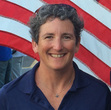Carol Newman Cronin's Blog, page 60
May 17, 2012
Face Time with Online Friends: Now Playing in 3D
“You’re getting MARRIED?”
I felt like I knew him so well, my online friend from halfway around the world. And yet I’d missed out on that most basic and important of data points… because we’d never actually talked about anything besides books and boats.
During the past month, I’ve had the great fortune to meet face to face with several friends and work acquaintances I originally got to know online. Their physical appearances sometimes surprised me (one smaller, and another much taller than I expected). But the personalities that shone through were amazingly familiar—like seeing a cardboard cutout suddenly stand up and walk around. These are your friends and work mates, in 3D.
One of the miracles of our modern world is the ability to meet and work with people from halfway around the globe. Shared passions and joint projects are no longer restricted by geography; we can work as closely with someone online as we would with someone living in our house. (Closer, maybe, in many cases.)
Friendships that originate through casual interactions on Facebook or Twitter often spread out to include a range of communications: email, chat, texts—even, in some drastic cases, snail mail. Choosing just the right 140 characters presents a very different picture of a new friend than what s/he might have hanging on the wall behind during in a video chat. Getting to know someone across a range of platforms is more 3D; more like meeting in person.
But no matter how well we get to know our online friends, shaking hands for the first time is still a bit spooky. Like meeting a long-lost cousin who has the same squint as your brother: eerily familiar, but somehow not quite right. The details are just slightly skewed, blurred, a copy of a copy—except that this is actually, finally, the three dimensional original.
So even with all our modern forms of communication, there is still no substitute for meeting face to face. Sitting across the same table, there’s time to move beyond knowledge share and really get to know each other. We can even chat about things that only seem important when breathing the same air—local taxes, the weather.
As for the wedding… I’ll be there in spirit. Creating carefully thought out messages of best wishes on a variety of platforms, wrapping them in virtual lace, and winging them across the pond.
May 11, 2012
Why Volunteer?
As many of you know, I spent last week helping to run the US Women’s Match Racing Olympic Trials, a stand-alone event run in Weymouth, England, the sailing site of the 2012 Games.
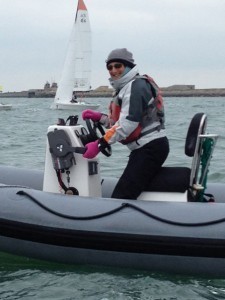
Does this look like a vacation photo?
Running a regatta in a foreign country (even one with a common language) creates amazing logistical challenges. Though we tried to figure out everything in advance, we still had many last minute issues to sort out on-site. And as the Organizing Authority (or OA), most of them landed in my lap. Support boats that had been reserved hadn’t yet arrived from another regatta, so we had to find fill ins for the first few days. New sponsor graphics for US Sailng Team Sperry Topsider didn’t show up until after the boats were in the water, which complicated getting the stickers in place. Last but not least, all the usual logistics of running a very, very important event were complicated by operating five hours ahead of the US, in a country where most of us didn’t have working mobile phones.
And yet once we were out on the water, it was all worth it. Our eventual winners, Team Maclaren’s Anna Tunnicliffe, Molly Vandermoer, and Deb Capozzi had to be at the very top of their game to win over the other US teams. The tight, exciting racing firmly established the US dominance of Women’s Match Racing. Best of all, the volunteers (eighteen people from a mix of countries, many of whom had never met before this event) coalesced into a team with one goal: providing the fairest regatta possible.
Which brings me to my original question: Why do we volunteer? Why take vacation time to travel abroad, share a room with an assigned roommate, put on layer after layer of fleece, wool, and waterproof gear to go out in a small boat when it’s forty degrees Fahrenheit and usually raining?
After a week, I can safely say that the reward is being part of a team. It’s the same thing I love about sailing with teammates who are motivated to bring their best effort to the race course, even though it takes them away from their families and is not particularly career-enhancing. It’s the same thing that makes it so hard to answer that off-hand airport question: Business or Pleasure?
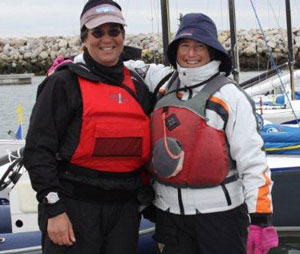
My best teammate, Liz Baylis, was a huge help running the event. We earned the nicknames "Thelma and Louise."
Working as part of a group like this (an international mix brought together by a common love of our sport) creates its own community: we each bring the best of our experience to the table, hoping to find a way to respond quickly and efficiently to any unexpected challenges.
Joining forces with a group to accomplish a specific goal, whether short term or long term, can be amazingly satisfying. It also teaches us about ourselves and expands our horizons in a way that would not be possible if we stayed home.
Thanks to all who made this event such a great success—especially the athletes, whose hard work made it work all the effort to put on such a challenging event.
And now, back to our regularly scheduled lives.
May 3, 2012
Mono-tasking Down the Shannon River: Look Ma, no Internet!
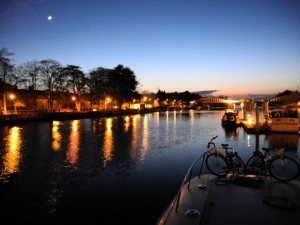
A quiet evening on the Shannon River, tied up in Athlone.
I wrote this story last week, during a luxurious river boat cruise in Ireland.
“What’s the latitude here?”
“I’m not sure,” my husband responds.
And then we both smile. Because if we were home, or in most other places we’ve been the last ten years, we’d quickly find our answer on the web.
Instead we go back to enjoying what has become a familiar view: a slow moving bow, pointing south between two river banks.
We’re taking a self-drive river boat down the Shannon, right through the middle of Ireland. The shorelines teem with unfamiliar flora, fauna, geology, constantly changing weather, and two thousand years of history. If we had access to the web we’d be digging deep, thirsty for knowledge about each new sight. Instead we’re simply enjoying what’s right in front of us.
Our top speed is less than 6 knots, so we have time to study how the river’s watery knife edge has sliced through a foot of black topsoil to expose the white rock underneath. We discuss the shapes of clouds racing across green fields, and inspect the moss-covered stones of bridges as they arch close overhead. And we’re both fascinated by the lock gates, thick wood beams strapped together with black iron that (we learn from text chiseled into the stone) have been controlling the water height here since 1841.
After several lazy days gliding through the middle of Ireland, I’m once again learning to see only what’s in front of me. No hyperlinked leaps from one lilypad of factoid to another, no “if you liked this, you might also enjoy” frame of reference. Instead of “I’ll Google that,” I’m back to “I’ll ask that person,” calling on half-remembered instincts I didn’t know I’d lost to find bike paths and restaurants and fresh bread.
Best of all, we’ve rediscovered the joys of leisurely conversation—with each other, with new friends, with dockside acquaintances or the neighborhood pub’s bartender. An online presence gobbles up as many hours each day as it’s allowed; without that distraction, the days seem deliciously long. (Of course, the lengthy Irish evening twilight and late sunset help too.)
Sure, we’re missing out on a few rich kernels of knowledge, like what that yellow flower is called or which group was invading from where during the siege of 1691. But what we’ve seen we will remember better. Because this week, we are mono-tasking.
There is always something more to learn or know about the world around us. Which has made it hard to experience only what is right in front of us. And that’s exactly why we need to get offline once in awhile. To re-invigorate our interpersonal skills, to be limited by geography again, to enjoy some face time with the ones closest to us.
But… I’d still really like to know the latitude.
April 26, 2012
KDP Select: One Foot in the Amazon Sandbox
I’ve been watching, reading, and listening as more and more authors announce the amazing fringe benefits of making an exclusive deal with Amazon.
The online retailer is now offering ebook authors the chance to enroll their books in KDP Select. In addition to receiving a share of the lending library proceeds from Amazon, authors are also able to promote those books as free for up to five days.
 In exchange authors must make that book exclusive to Amazon, for at least ninety days.
In exchange authors must make that book exclusive to Amazon, for at least ninety days.
Many of the authors I know who have combined KDP Select with a carefully thought out marketing plan find it dramatically boosts their sales. Christine Kling’s excellent Caribbean thriller, Circle of Bones, hit #2 on the Kindle Top 100 Free List after she joined KDP. Mark Chisnell has also reported excellent results after making his new thriller, The Fulcrum Files, free for a day.
But I am still teetering on the fulcrum of indecision. Especially since Amazon lost my reviews. Do I really want all my publishing eggs in their basket?
It’s not that exclusivity on Amazon would cost me a lot in sales elsewhere. Amazon seems to be the default online purchasing option for many book buyers, and it’s not hard to understand why. The buying experience is the easiest around (one click ordering from any Kindle, free samples of many books, recommendations that really appeal, reviews from real readers), once you have a credit card on file.
And yet, KDP Select still leaves a chalky taste in my mouth. I keep thinking there must be a catch, distrusting anyone who offers (for free) to help me sell my books.
Beyond that, I really don’t like the idea of one company controlling more and more of the literary marketplace.
It’s really a new take on an age-old dilemma: how much do I let my sense of how the world should be affect my actions, even though it might be decreasing my sales? Realistically, it’s hard to think that one author choosing not to list with KDP will really help to save even one independent bookstore.
Meanwhile, the blogosphere war rages on between traditional publishers (whose market share is declining) and new authors who say KDP Select is the best thing since Word Perfect. And I watch, read, and listen, trying to decide whether to ignore that chalky taste and climb into the Amazon sandbox with both feet.
Stay tuned for the answer.
April 19, 2012
Calling all Readers: Game of Sails Needs Your Help
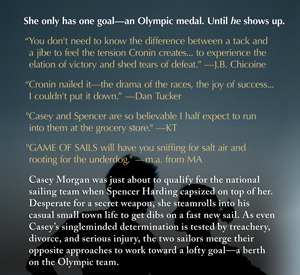 “Amazon lost my book reviews.”
“Amazon lost my book reviews.”
Doesn’t that sound like “the dog ate my homework”?
But it’s true. When Game of Sails (the ebook) was combined onto one page with Game of Sails (the paperback), nine months of priceless feedback from readers (averaging 4+ stars) disappeared into the ether. Which means those words will never be available again to decide “Was this review helpful to you?”
“Why didn’t you save them all to your hard drive?” a friend asked.
“Because it never occurred to me they’d be lost,” I responded.
It always seems as if the information stored on the web will be available forever—until it disappears without a moment’s notice. Malicious? I can’t imagine it. Amazon has been so supportive of small authors, it’s hard to conceive of a reason why they would intentionally delete my book’s reviews. After all, almost all of them were very positive.
More likely this is just a plain old-fashioned mistake. Apparently that can happen, even on a page hosted by an expert in the field. And there’s no recourse that I know of.
Fortunately I used some of the best feedback on the back cover of the paperback, so those words are preserved forever. And J.B. Chicoine was able to repost her supportive words (apparently she’d saved a copy on her hard drive, earning my undying respect and admiration). But even those reviews that now appear on paper (m.a. from MA, KT, and Dan Tucker) can’t be recreated on the Amazon page by the book’s author; only the individual reviewers can replace them.
This strange occurrence has left the book looking more unloved than it really is, which leads me to ask you all a big favor:
If you’ve read Game of Sails (whether you liked it or not), please consider writing a review and posting it on the Game of Sails Amazon page (or wherever you usually post book reviews). It doesn’t need to be anything fancy or long-winded, and it doesn’t matter if you read the ebook or as a fresh new paperback.
Why This Matters So Much
Books from small publishers don’t usually receive traditional reviews, so they need grassroots support to gain visibility. Amazon ranks books based on an algorithm that includes how many reviews a book receives; a minimum of ten is required to be included on the all-important top 100 lists that will lead new readers to discover the book. Through no fault of its own, Game of Sails has now fallen below the ten reviews needed to maintain its position on ranking lists that will gain it more visibility. That’s why your support is so important right now.
A little bit of effort on your part would be a great help to me (and Game of Sails). And it only seems fitting in this Olympic year, to help out an Olympic love story.
Thank you!
And the next time the dog eats your homework (or Amazon eats your reviews), I will be standing by to back you up.
April 12, 2012
Writing for Free: Why I Blog
 Work in Progress not progressing? Must be time to write a blog post.
Work in Progress not progressing? Must be time to write a blog post.
Blog posts, after all, are just short snippets of thought. They don't require character arcs, or plot development, or outlines. They don't require much at all, really, except a quick trigger that is intriguing enough to require more exploration.
I enjoy blogging, or I wouldn't do it. After all, as an editor-friend says, "What's the point of writing for free?" My answer (and I won't pretend it's anything other than a justification): it's creatively satisfying. It gives me the chance to share my thoughts and views with others, worried only about communicating an idea and not whether that idea will sell.
But I also wonder if blogging is a bit of a crutch for those of us who fancy ourselves as novelists: when in doubt, write a blog post. It's kind of like hitting the bottle before breakfast instead of using it as a reward for the hard work that precedes cocktail hour: too easy, too much of a quick fix.
Freeing the creative piece of my brain is impossible if I'm worried about paying the bills. Lately I've discovered I also have a hard time being creative if there are too many other demands on my time, making it seem ridiculous to "write for free." Somewhere in between the two lies my imagination's mecca: a month of mornings with rain tapping on the window, no looming travel plans, no book signings, and only a slight pressure from clients.
But the next time that might be the case is at least six months from now.
So for now, I try to keep slogging away, writing bits and pieces of a new story in hopes they will eventually add up to a plot that excites me so much I will neglect what I "should" be doing.
After all, it's hard to complain about being too busy to write for free.
April 5, 2012
Finishing off The Unfinished Work of Elizabeth D: Book Review
I was lucky enough to receive an advance copy of "The Unfinished Work of Elizabeth D.," Nichole Bernier's much anticipated debut novel, which comes out on June 5. The plan was for me to recommend it to a few bookstore owners, assuming I enjoyed it. I never planned to fall in love with all her characters, so deeply that I missed them as soon as the last page was turned.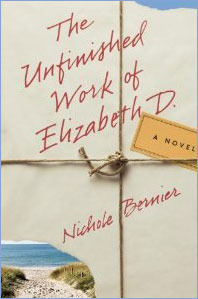
The book arrived on a Friday, and after admiring its lovely cover I set it aside until that evening. As soon as I started the story, though, I knew I'd have a tough time putting it down. The result? I inhaled it over the weekend.
I was so torn, between finishing and not finishing, between savoring and inhaling… but it was the weekend. So why should I deny myself this not terribly guilty pleasure?
It's easier to write about the first blush of romance than about a realistic marriage, but Bernier nails it. This is how happily-ever-after looks for imperfect characters trying hard to do their best with their marriages and lives. Best of all, hints propel the story forward; rather than hitting us over the head with plot points, Bernier has built a trail of breadcrumbs, dropped in a seemingly casual progression to lead us toward the only logical conclusion. And that's the hardest part of writing well; it requires the author to maintain a fresh perspective about how much information is just enough, which is usually hard to come by after hundreds of readings and thousands of edits.
The writing and word choices are careful and precise but never distract from the story, which flows from a George Washington Bridge beginning to a quiet backyard end. In between, the characters don't get any of the easy outs that are available only in fiction and never in real life.
I wish I could inhale it again, from scratch, this weekend. Instead I'll recommend Elizabeth D. to anyone who is looking for a summer read of well-written literary fiction that includes a touch of real spice. Add it to your wishlist… this will be a great addition to any library, rain or shine.
March 29, 2012
Stranger than Fiction, Indeed: How a Movie Helped my Writing
On date night last weekend we watched "Stranger than Fiction," a 2006 film directed by Marc Foster. It was my pick, but as usual I couldn't remember anything about the plot or who was in it. So we just hit "play" and sat back to watch.
After two minutes, we both thought about shutting it off, because it was a little hard to follow and quite lacking in depth. A guy (Will Farrell) brushing his teeth for five minutes, with a woman (Emma Thompson) narrating? As dull as it sounds.
Fortunately we gave it a little more time, and thirty seconds later we were both hooked. The woman narrating was the author! She was writing this character to life, and he became more and more fleshed out with each pass of the toothbrush—just like it happens on the page, when I'm getting to know a character.
It also became clear why the scene was overlaid with graphics, drawn in as if with an Etch-a-sketch. The author was sketching in the backdrop, adding details as quickly as she figured them out. Kind of like a visual interpretation of how my brain works out what a place looks like, as I'm writing about it.
Best of all, the movie didn't dwell on this character and scene building; by the time we'd figured out what was going on the story had moved on, weaving an intricate plot between several distinctive characters that could be enjoyed for its own sake. As the main character struggled to vocalize his dreams, the author tried to find a way to overcome ten years of writer's block. Meanwhile over everything, death loomed.
In the end author and character ended up helping each other grow, which made perfect sense to me. And it was also a great reminder that what seems inevitable can be changed to fit new circumstances, as long as it fits the story.
It was such a treat to see an outstanding cast explore how imagination interacts with reality, how characters become "real," and how authors can find inspiration from an apple rolling down a street. I'm sure a non-writer would not enjoy this movie the same way I did, but it's worth watching anyway—just for the great acting and story.
For more on the joys of Creating Reality, read Juliette Fay's latest post on Beyond the Margins.
March 22, 2012
My Family of Snipe
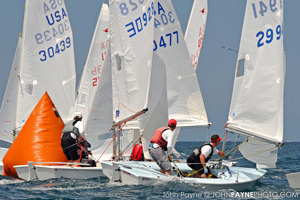 When I think of family, my first thoughts are pretty standard: husband, parents, siblings, nieces and nephews, in-laws. But I'm a member of several other family trees as well. One of those is my family of Snipe.
When I think of family, my first thoughts are pretty standard: husband, parents, siblings, nieces and nephews, in-laws. But I'm a member of several other family trees as well. One of those is my family of Snipe.
While most people think of the Snipe as a well-hunted and elusive bird, to me it means a 15 foot sailboat that has been raced hard worldwide by teams of two for almost eighty years. The class motto is "Serious Sailing, Serious Fun," which offers a wide range of goals: win on the race course, win the party, or try for both.
In mid-March fifty-three boats from nine countries met up in Florida for our annual ten day reunion, otherwise known as the Winter Circuit. We laughed with and at each other, we told and retold jokes, and we even rolled our eyes at the Snipe equivalent of loud Uncle Harry, telling the same tasteless jokes after downing far too many drinks. In short, it was just like any other family vacation.
Some would call this kind of group a "community," but that just doesn't communicate the warmth and depth of our shared passion. The Snipe is a hard boat to sail, and the constant challenge of success keeps us all working hard. After a long day on the water, there's nothing quite so satisfying as reliving the high (and low) points with another skipper or crew. Language barriers disappear; we all speak Snipe.
This was my twentieth Winter Circuit, so I've achieved "regular" status. To inspire my continued dedication, there are many sailors who have sailed the boat for five or even six decades. And thanks to a strong junior group moving up the ranks, I know the competition will be top-notch for many years to come. Middle age has never felt so good.
Sometimes just showing up is enough to build relationships. After traveling to the same locations, climbing into the same boats, and lining up on a tight starting line with so many familiar faces from around the world, we recognize each others' quirks. We share a parking lot, a boat rigging area, a race course, and this forced intimacy is a large part of what makes it all so special.
Besides our sailing habits, we know little or nothing about each other. I can rattle off another Snipe sailor's favorite shirt and hat color, whether someone is likely to leave the dock early or late every morning, and where most of us are likely to start and finish in a typical race. But I usually can't tell you what another sailor does during the work week or exactly where s/he lives. And that's okay; most of us are on vacation, trying to escape from whatever 9-5 routine we slog through between regattas.
Within the family of Snipe, there are also more traditional family units. Sons and daughters sail with their parents until they are old enough to sail with their friends. Husbands and wives sail together—even a few brothers and sisters team up, long after they've built families of their own. The multi-generational aspect of the class is a large part of why it feels like one big mostly-happy, mostly-functional family.
And just as no two Thanksgivings are ever the same (even with Uncle Harry repeating the same tasteless jokes), no two Snipe regattas are ever the same either. Seen from the outside the differences may be ridiculously subtle; for members of the clan, a ten minute advance in when one team leaves the dock can provide a topic for in-depth discussion. Does he know something we don't? Or is his watch wrong?
After each regatta, we drive or fly back to our regular lives again, tired but satisfied. We look ahead to the next event, determined to move up in the standings… or just to share one more story from a past event with one of the junior teams. After all, shared history is a large part of what keeps a family together.
That, and Uncle Harry's tasteless jokes.
Photo: 2011 Snipe Pan Am Trials. John Payne Photo
MIDWINTERS WALTZ
White over blue, sun-sparkled hue
Even the clouds light up gold
Salt, rinse, repeat—a burn on my feet
Why does this never get old?
Each year we come down, leave behind lives and towns
To meet up again on this shore
Old lies and tall tales bend like palms in a gale
In this family that shares nothing more
Nothing more than a passion, nothing more than goal
Nothing more than a wish to be here
We all have our ways, and we'll all have our day
The next shift, the next race, the next year
East coast to west, last up to best
Across generations and seas
Together we'll find a way to unwind
And we know it's the best place to be
'Cause it's all about passion, it's all about goals
It's all about being right here
If we live our own way, then we'll all have our day
The next shift, the next race, the next year
March 8, 2012
Why it Took 18 Years to Write Game of Sails
Last week I received a very special package from Hank, our friendly UPS driver: three large boxes.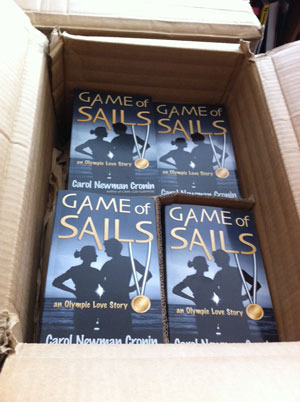
He was offhand about the delivery, worried only about the weight and that one of the boxes was starting to come untaped. I, however, could barely contain my excitement. Because inside those three nondescript cardboard boxes lay copies of Game of Sails, a story that had taken the better part of two decades to get published.
Flashback to 1994, when many sailors I knew were working toward the 1996 Olympics in Savannah. I began to write notes to myself about two Olympic hopefuls working toward the same lofty goal in completely opposite ways: one working harder than anyone else and focusing solely on going to the Games; the other hoping to coast through on ambition-free talent. Neither approach, I knew from watching the sailors around me, would be successful on its own.
And so were born the two characters that grew into Casey and Spencer.
I hadn't yet admitted to anyone (except the guy who would become my husband) that I was writing a novel. So when I volunteered for race committee at the Star/Finn Trials in the spring of 1996, I felt like an imposter. Masquerading as a good-hearted volunteer, my primary motivation was selfish: I wanted to experience how a Trials event felt.
Because it never crossed my mind that I would win an Olympic Trials, eight years later.
I watched the Savannah Olympics as best I could through the newspapers; the sailing didn't make it on TV. And for the next four years I wrote, cobbling together a story around my two opposites. I also sailed with a wide array of top-notch teams, learning that every winner has a different style while my writer's eye roamed the boat park, searching out snippets to show rather than tell the simple joys of competition and sailing and talent.
In 2001 I decided to put together my own Olympic effort. By February 2004, when the Cronin Sailing Team won the Olympic Trials in the Women's Keelboat discipline. I'd learned a lot about teamwork, talent, and training. But I still hadn't finished the damned book.
When I came home from Athens, I realized I now had all the knowledge I needed to fill in the blanks in my story. I began to write again, laughing at how thorough I'd been in my research: I'd sailed in the Olympics!
But it was too raw, too personal. It wasn't until after I stepped away from Olympic sailing that I was finally able to finish, transforming the details from my own experience into a background against which my two characters would play out their final scenes.
Which brings me up to last week, when Hank delivered the first printed copies—only a few months before the 2012 Games.
"Careful, it's heavy," Hank warned, as I grabbed the last box from him.
Yes indeed—eighteen years of heavy.

